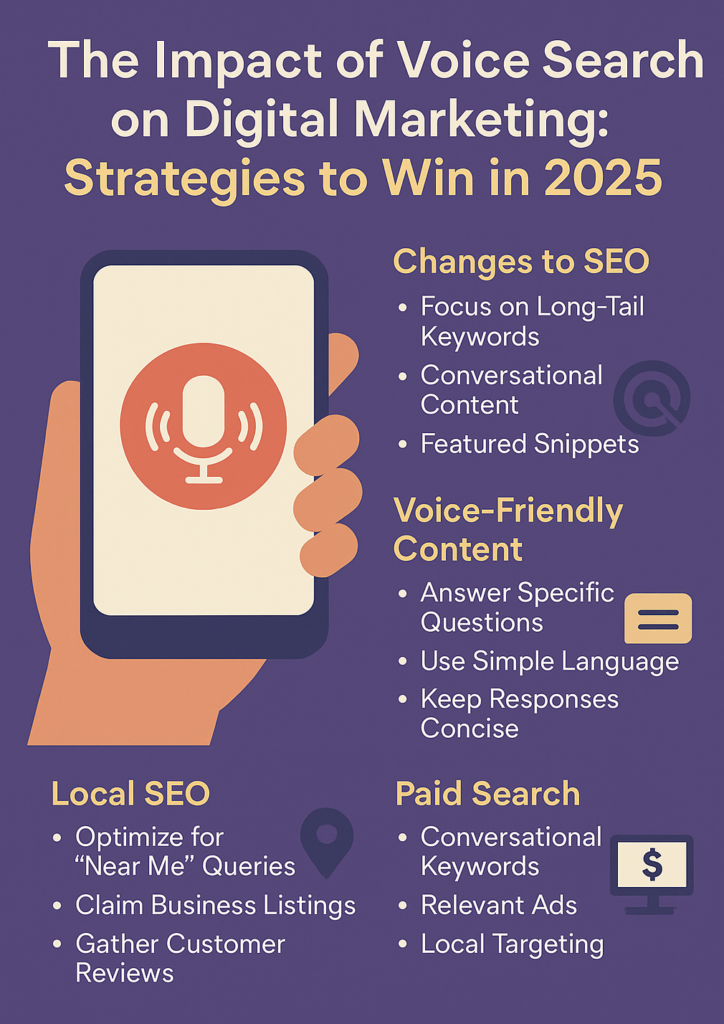The Impact of Voice Search
Voice search is no longer the future — it’s the present. With the rise of virtual assistants like Siri, Alexa, and Google Assistant, more people are using their voices to search for information online. As a result, digital marketing strategies are evolving. If businesses want to stay ahead, they must understand the impact of voice search on digital marketing.
In this blog, we’ll explore how voice search is changing SEO, content marketing, and customer engagement — and how you can adapt your strategy to win in 2025.
Why Voice Search is Growing Fast
Voice search is growing because it’s fast, easy, and convenient. Instead of typing a question, people can simply speak it. According to recent studies, more than 50% of online searches are now voice-based. With the growing use of smart speakers and mobile devices, this number will continue to rise.
Key reasons for the rise of voice search:
- Hands-free convenience
- Faster search results
- Natural, conversational interactions
- Growth of smart home devices
How Voice Search Affects SEO
Traditional SEO focused on short keywords like “best pizza New York.” But voice search changes this. Now, people speak naturally and ask full questions, like “Where can I find the best pizza in New York near me?”
Important SEO shifts due to voice search:
- Focus on Long-Tail Keywords: Voice queries are usually longer and more specific.
- Conversational Content: Your content should sound natural, as if answering someone’s question.
- Featured Snippets: Many voice assistants pull answers from featured snippets. Try to get your content into Google’s Position Zero.
- Local SEO is Critical: Voice searches often include terms like “near me” — local businesses must optimize for local keywords.
Pro Tip: Use tools like Google’s “People Also Ask” feature to find common voice search questions and create content around them.
Content Marketing in the Age of Voice Search
In 2025, creating voice-friendly content is a must for digital marketers.
Best practices for voice search content:
- Answer Specific Questions: Create FAQ pages that answer customer questions directly.
- Use Simple Language: Avoid jargon. Write like you’re speaking to a friend.
- Keep It Short and Sweet: Voice search often pulls short, direct answers.
- Structure Your Content Well: Use headings, bullet points, and clear sections to make your content easy to scan (both for users and search engines).
Remember, people using voice search want quick, accurate answers — give them exactly what they are looking for.
How Voice Search Changes Paid Advertising
Voice search is also impacting PPC (pay-per-click) advertising.
- Fewer Visible Ads: Since voice assistants often give only one result, it’s even more important to target the right keywords and create highly relevant ads.
- Conversational Keywords: Ad campaigns must focus on longer, more natural phrases.
- Focus on Local Ads: As more voice searches have local intent, hyper-local ad targeting becomes more effective.
Brands that adapt their paid search strategies to match voice queries will gain a competitive edge.
The Role of Local SEO in Voice Search
Local SEO and voice search go hand-in-hand. Studies show that a large percentage of voice searches are local. People ask for things like:
- “Where’s the nearest coffee shop?”
- “Best hair salon open now near me.”
If you run a local business, optimizing for local voice search is crucial.
Local SEO tips:
- Claim and optimize your Google My Business listing.
- Ensure your name, address, and phone number (NAP) are consistent across the web.
- Include local keywords naturally in your content.
- Collect positive reviews — they help you appear in local search results.
Future Trends: What’s Next for Voice Search and Digital Marketing?
As technology evolves, voice search will become even more important. Here are some upcoming trends:
- Voice Shopping: More users will buy products via voice commands.
- Personalized Search Results: AI will make voice search even smarter and more personalized.
- Voice SEO Services: Agencies will specialize in optimizing for voice search.
Smart marketers will start preparing now, focusing on natural language SEO, mobile-first websites, and local optimization.
Conclusion
Voice search is not just a trend; it’s a major shift in how people interact with the internet. Digital marketers must adapt their SEO, content, and advertising strategies to meet the needs of voice search users.
By focusing on long-tail keywords, local SEO, conversational content, and mobile optimization, businesses can stay ahead of the competition and make the most out of the voice search revolution in 2025.
Start optimizing today — the voice of the future is already here!
For more such content check out more article here Trendify Digital
Facebook page: Trendify Digital
Instagram Page: Trendify Digital
